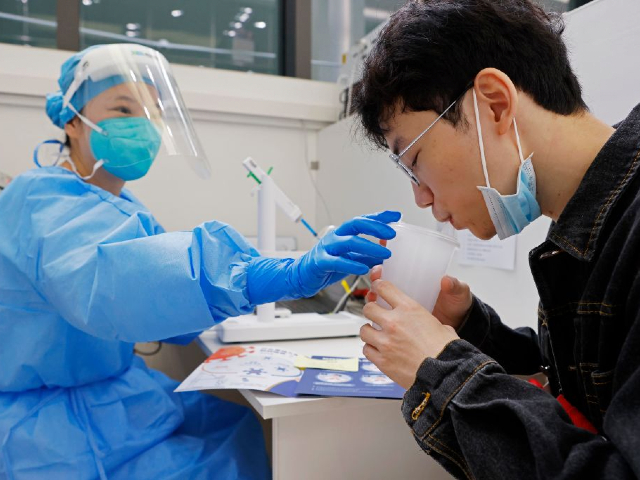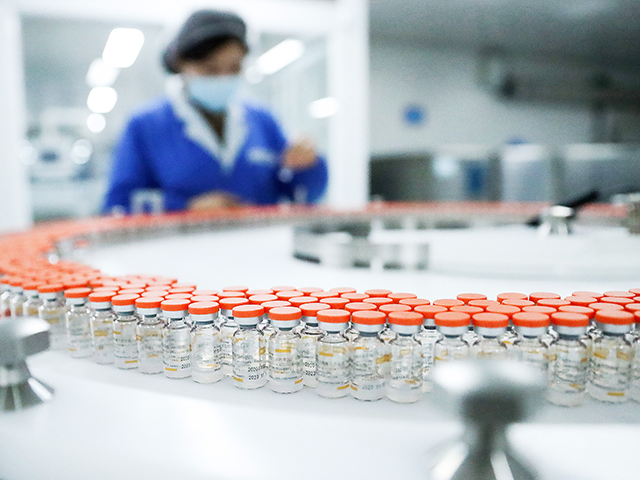The Chinese National Health Commission debuted a new timeline for Wuhan coronavirus vaccination on Monday, demanding that citizens over 18 receive a booster shot three months after their first vaccination or after a confirmed coronavirus infection.
The Commission also announced that it had approved a Chinese-made mRNA technology coronavirus vaccine to be used as a booster, scheduled to be made available to the public imminently.

A medical staff member (R) receives a booster shot of the Sinopharm Covid-19 coronavirus vaccine at a hospital in Wuhan in China’s central Hubei province on November 25, 2021. (STR/AFP via Getty Images)
The new guidelines cut the previous six-month wait period before receiving a booster by a month and include those who have been confirmed infected recently, meaning an infected person should receive a “booster” dose three months after their infection. The guidelines appear to apply to all eight of the vaccine products, all domestically developed, that the Chinese Communist Party has approved for public consumption, despite the fact that they use different technology to allegedly generate immunization and are manufactured by different companies. They also include a ninth, mRNA-based product soon to be in circulation and a tenth protein subunit vaccine product.
Chinese public health officials recommended that citizens receive a booster dose of a vaccine that uses different technology than their first dose. Their announcement did not specify, however, how many boosters patients should receive in the long term.
China, unlike many other countries, has not tied the civil rights of citizens to coronavirus vaccine product consumption, though the civil rights of Chinese citizens are by default tremendously limited under communism.
“The Joint Prevention and Control Mechanism of the State Council issued the notice on Monday, stressing that the current focus of vaccination is to bridge the gap in immunization levels among different target groups to further reduce the risk of severe illnesses and deaths,” the state-run Global Times publication reported. It noted that the “domestic mRNA vaccine will be put into emergency use to enhance the immunization of adult people.”
Currently, only two coronavirus vaccine products widely available internationally use mRNA technology: the American product by Moderna and the product distributed by America’s Pfizer, the European company BioNTech, and the Chinese company Fosun Pharma. Despite the involvement of Fosun Pharma, the Chinese government has not approved the use of its vaccine product within its borders.
The Chinese mRNA vaccine product soon to be distributed was created by the domestic firm CSPC Pharmaceutical Group and allegedly targets the dominant omicron variant of the Wuhan coronavirus – in contrast to the mRNA vaccines currently in distribution in the United States, which target the original alpha variant. Chinese authorities approved the vaccine product on March 22 but clarified on Monday that it would be used only as a booster for now. The Global Times also mentioned that authorities would begin distributing “the protein subunit vaccine called SCTV01E vaccine developed by Sino Cell Tech” for adults.
The two will join the most widely distributed Chinese coronavirus vaccines, by the companies Sinovac and Sinopharm, alongside lesser-known products by the Chinese firms Shenzhen Kangtai and Livzon Mabpharm, the latter not approved for use in any other country. Also approved for use in China are two products by the pharmaceutical company CanSino: both viral vector products, one injectable and one ingestible.
The Chinese government heavily promoted the CanSino “air” vaccine when it debuted in October, promoting it as “sweet” and fun to receive. The city of Shanghai held large government-sponsored events offering the inhalable shot as a novelty.

A resident takes inhaled booster vaccination on October 26, 2022 in Shanghai, China. (Yin Liqin/China News Service via Getty Images)
“Utilizing the same adenovirus vector technological platform as the intramuscular version Convidecia™, Convidecia Air™ provides a non-invasive option that uses a nebulizer to change liquid into an aerosol for inhalation through the mouth,” CanSino announced following the product’s approval. “Convidecia Air™ is needle-free and can effectively induce comprehensive immune protection in response to SARS-CoV-2 [the Wuhan coronavirus] after just one breath.”
The latest campaign to convince Chinese citizens to ingest regime-approved vaccine products follows one of the most severe waves of coronavirus infection the country has documented since the pandemic began, worsening in the winter months following an abrupt policy change in November. After a dramatic weekend that month in which thousands of Chinese people took the streets of nearly every major city demanding an end to the Communist Party’s brutal lockdown and quarantine camp interment policies, Beijing announced it would “optimize” its policies, eliminating city-wide lockdowns and suddenly ending most pandemic security protocols. Coronavirus cases skyrocketed nationwide, leading to estimates of as many as 5,000 deaths a day. The Communist Party claimed that the wave had largely ended by late January and its health experts continued to claim this week that they did not expect any large outbreaks anytime soon — even as they demanded citizens receive booster shots.
“Immunity levels tend to gradually diminish over time, so some people still need to get vaccines so as to strengthen protection against the disease,” the Chinese National Health Commission said on Monday.
The Chinese Centers for Disease Control (CDC) claimed as of last week that over 90 percent of the population of China had receive coronavirus vaccine product doses, an eye-popping number given traditional vaccine hesitancy in the country. China’s pharmaceutical companies had been embroiled in multiple scandals in years prior to the coronavirus pandemic involving faulty or watered-down vaccines, most prominently the 2018 Changchun Changsheng Biotechnology scandal in which nearly 1 million children were left immunologically vulnerable after the company watered down critical early childhood vaccines. The scandal resulted in loud and sometimes violent protests by mobs of outraged parents, including an incident in which hundreds of parents surrounded and beat a Communist Party official on the streets of Jinhu, Jiangsu province, in 2019.
More recently, in 2021, the Chinese government admitted that criminals selling counterfeit Wuhan coronavirus vaccines had made nearly $3 million preying on Chinese citizens seeking to inoculate themselves. The largest of these operations injected people with saline or mineral water and generated $2.78 million.

COMMENTS
Please let us know if you're having issues with commenting.